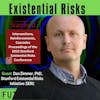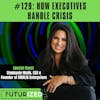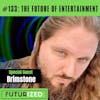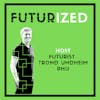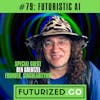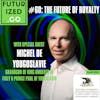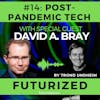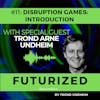The future of learning experience design

Jon Tota, CEO and founder of Syntax + Motion and host of the Learning Life Podcast, interviewed by futurist Trond Arne Undheim.
In this conversation, we talk about The future of learning experience design. Shifting focus from the teacher to thinking abo...
Jon Tota, CEO and founder of Syntax + Motion and host of the Learning Life Podcast, interviewed by futurist Trond Arne Undheim.
In this conversation, we talk about The future of learning experience design. Shifting focus from the teacher to thinking about learners first. How to teach true skills? How do you get the user to interact? From learning management systems (LMS) via design thinking to learning experience platforms (LXP). Should everybody have their own online course for personal branding? Corporate learning. Individual thought leadership. How to navigate the noise? What to consume? What to produce? How to earn money with content?
The takeaway is that learning experience design is an ever-evolving field which finally is taking off. We need it. Learning should be fun, interactive, engaging and learning software platforms should be well thought out and easy to use. It’s slowly starting to happen.
After listening to the episode, check out Syntax + Motion, the Learning Life Podcast as well as Jon Tota's online profile:
- Jon Tota (@jontota) https://thriveloud.com/thrive_loud/272-jon-tota/
- Syntax+Motion ( https://www.syntaxproduction.com/
- Learning Life podcast https://learninglifeshow.com
The show is hosted by Podbean and can be found at Futurized.co. Additional context about the show, the topics, and our guests, including show notes and a full list of podcast players that syndicate the show can be found at https://trondundheim.com/podcast/. Music: Electricity by Ian Post from the album Magnetism.
For more about the host, including media coverage, books and more, see Trond Arne Undheim's personal website (https://trondundheim.com/) as well as the Yegii Insights blog (https://yegii.wpcomstaging.com/). Undheim has published two books this year, Pandemic Aftermath and Disruption Games. To advertise or become a guest on the show, contact the podcast host here.
Thanks for listening. If you liked the show, subscribe at Futurized.co or in your preferred podcast player, and rate us with five stars. If you like this topic, you may enjoy other episodes of Futurized, such as episode 73 on The Future is Social Learning, episode 65 which is on The Urgency of a Social-Emotional Learning Fix, or episode 51 which is on AI for Learning, episode 27 on the Future of Online Learning, episode 28 on The Future of K-12 Education, or episode 22 on the Future of Engineering Education. Futurized—preparing YOU to deal with disruption.
Online Ed for Enterprise_mixdown
Trond Arne Undheim, Host: [00:00:00] Futurized goes beneath the trends to track the underlying forces of disruption in tech policy, business models, social dynamics, and the environment. I'm your host throw, not even time futurist and author in episode 75 of the podcast. Topic is the future of learning experience design. Our guest is Joan toda, CEO, and founder of syntax and motion and host of the learning life, the podcast, and this conversation, we talked about the future of learning experience design, the shifting focus from the teacher to thinking about learners first, how to teach true skills.
[00:00:41] How do you get the user to interact from learning management systems LMS via design, thinking to learning experience platforms or LSPs, should everybody have their own online course for personal branding? Corporate learning individual thought leadership and how to navigate to noise, what to consume, what to produce and how to earn money with content and future directions.
[00:01:09] John, how are you today?
[00:01:11] Jon Tota, CEO, Syntax + Motion: [00:01:11] I'm great. John. Happy to be here. Yeah. It's
[00:01:13] Trond Arne Undheim, Host: [00:01:13] so good to be with you here. To chat about something really interesting. The future of learning experience design. I wanted to first John, just address the fact that, you're a bit of a pioneer in online education and you've already sold one company in the field and you're developing another right now.
[00:01:33]But your background seems to be very different. You've had some time on wall street, but before that you were waiting tables and then at some point you got your screenplay adopted. So you have a quite interesting background that I wanted to dig into a little bit, but from the perspective of how on earth did you get to learning experience design from that?
[00:01:56] Jon Tota, CEO, Syntax + Motion: [00:01:56] Yeah, so it's it's an interesting story. Like you said, when I was in college towards the end of my time in college, which now it's over 25 years ago, so it's it was a different world back then, but I really wanted to be a screenwriter. That's that was my plan. I was going to get out of college and I just thought it, you write a script and next thing you're at the Oscars.
[00:02:17] And of course it was a little more challenging than that, but I wrote a number of screenplays. A bunch of them got options. I did quite a bit of work in that area for a little while. But. Nothing really panned out the way I had expected in my whole family had always been on wall street, my dad and my brothers.
[00:02:33] And so I finally gave in, took my after a lot of offers from my father, I took one of them joined him on at the time it was Paine Webber and then eventually became a UBS today, but I didn't really want to be a stockbroker. I said, I'd rather learn computers. And so I got into their training program there.
[00:02:51] They taught me about land technology. And when technology back then, it was when you had the large mainframes and workstations on everybody's desk. And I loved learning all the technology. I'd never really been in that field. I was more in the creative side and I really found this niche of training financial advisors on how to use the technology.
[00:03:12] And then fast forward from there, I joined a small consulting firm, partnered up with a gentleman in that space. And we had done essentially that setting up networks for, and this goes back to the late nineties, setting up networks for financial insurance agencies, independent brokerage firms and training them on how to use the technology.
[00:03:31] And then one thing led to another because I wanted to be a screenwriter and producing feature length films. The logical thing to do would be to start creating training videos. We did that. We started creating training videos on the, on how to use the technology that we were installing. And and that led to the the start of excellence, which was the company that I co-founded back then, and then got into the video training space.
[00:03:55]
[00:03:55] Trond Arne Undheim, Host: [00:03:55] And video training is interesting in and of itself because Yeah. Video as a medium for me, I, it's grown on me. But video is so many things. What is it about video that, that fascinates you? You the most.
[00:04:10] Jon Tota, CEO, Syntax + Motion: [00:04:10] So it's interesting question now, because I think today we do a lot more in audio production than we do in video.
[00:04:17]And that's just the way things have gone a little bit for us, but I was, I always wanted to be, I was obsessed with film and and wanted to be a filmmaker back when I was in school. And and then I think what it was at the time that we got started with video training, because if you think about we launched excellence and back in 2002, the very first iteration of knowledge link our platform, which was the video training system we released in 2004.
[00:04:44] So it was before YouTube was mainstream and people just accepted that they could learn through video online. And I think what I loved is just, I was more of a screenwriter. I loved scripting it, and then it was actually a less expensive. Easier way of producing e-learning back then, because it just had a talking screen on a background.
[00:05:07] And and we weren't doing anything hugely innovative with the video format back then. It was just this idea that no one had ever really seen training. In video online back then. So it was, it felt great just to be able to innovate in a space like that, where everything was CD rom based slide show training.
[00:05:26] And we were doing an Nvidia.
[00:05:28] Trond Arne Undheim, Host: [00:05:28] The thing with video is like you pointed out, it's so many things I've recently tried to learn it this summer, actually, because, one thing is a podcast, but then, it would be great too, to also evolve it into a little bit of a video podcast. But I have realized one thing, which is audio and video are quite different things.
[00:05:48] And. I think the primary has to be audio, no matter how you turn it even if you're trying to create professional video, you really have to start with high quality audio. That's one thing that I've understood. I don't know if you agree with that, but but the other thing that I wanted you to comment on is, video has evolved so much.
[00:06:08]I'm just in the beginning of this learning journey with video, but somehow these YouTubers managed to many of them just chat and really not do very much, but it's it's the, whatever the content date just directly can produce that, that is so engaging somehow. And then others obviously edit and have all these angles and different cameras and different B roll and, make it very complicated and also very labor intensive so that, five minutes of video.
[00:06:39]We'll take your eight hours of shooting. What's your view on that? So before we get into kind of the nitty gritty of this, but is video now going in these two directions that both for learning and for entertainment that, it's possible. If you have the magic, you can just do it live.
[00:06:56] And, you develop a brand and people love you and you don't have to worry about the quality. And on the other hand, are these skilled sort of craftsmen that's just pain over every second on the video. How do you explain that these two coexist both in the learning and in the education space and you feel free to disagree with me, but that's so my observation of what's happening right now.
[00:07:19] If you're looking at the online space for those two subjects, sort of entertainment and education,
[00:07:25] Jon Tota, CEO, Syntax + Motion: [00:07:25] Yeah, I think it's a great question. And I look at it specifically from the learning, the online education perspective, as opposed from, just pure entertainment online. But I think it really depends on the content.
[00:07:38]What you will see today because there is so much learning that's video based online that sometimes the content truly lends itself to a higher level production. It requires it to keep the engagement or to have the learning value that you need. That production is truly valuable. In other cases, the content is just as well delivered by a person speaking to the camera.
[00:08:03] And the, as you said before, Critically important in either format that you have good audio quality, you have good lighting. You use the effects where you need them. Some people go a little overboard with all the motion graphics and they almost are just trying to cover up the screen with motion as much as possible.
[00:08:21] But if the content doesn't call for it, It's not necessary. And I think what you'll see today and take masterclass for a good example for any of your listeners, obviously on the consumer side, that might be one of the more notable consumer based learning platforms that's doing really well. If you watch it in the masterclass sessions, largely it's just a talking head video, but that talking head is Dustin Hoffman or James Patterson or Serena Williams, so when you have such celebrity in your learning content, just seeing them in person talking to you is the value, and they don't need to do anything special with motion graphics or B roll or anything like that. But then when you're dealing with traditional learning, that's done maybe the most exciting content and you're not drawn to it in that same way.
[00:09:11]And we did a series for a client of ours that was HR training on sexual harassment and anti-discrimination, and the owner of the firm said, I need to cover up the video with at least 70% of the video has to be covered up with some form of motion because his feeling was that the content wasn't engaging enough, so they needed it, the movement to keep people interested.
[00:09:32] And yeah, I do think it, it tends to fit with the content or the content requires either more movement, more production, or it can get by with less.
[00:09:42] Trond Arne Undheim, Host: [00:09:42] Why don't we jump into the the specific space that you have innovated and because, in the olden days, which I don't know, maybe 15, 20 years ago, these learning management systems LMS is they were very structured and like you, I think started talking about, they didn't really have a lot to them.
[00:10:04]But on the other hand They were all we had to tell us about this evolution, into what now is called learning experience. What is this experience part? How does it look different? How does it produce different results or is it just a natural evolution? Because we have, what is it that we have learned about the medium in the e-learning space to, to develop experience-based platforms and what do they really look like?
[00:10:32] Jon Tota, CEO, Syntax + Motion: [00:10:32] Yeah. So I think this is one of the more interesting aspects of where we're at now in just the online education space overall, that when we built our platform back in 2002, 2003 learning management systems were just getting popular because content had been delivered on CD ROMs and DVDs previously.
[00:10:52] And so that everyone's making this move to bringing content online, delivering in a digital format and. The need then was we need to manage this content. We needed to report somewhere. So we have tracking, we know that people consumed it. Cause now they're outside of a classroom, they're doing it online.
[00:11:10] And so really when I speak about the evolution of learning management systems, It's not that they're being replaced. The buzzword today is LSP learning experience platforms. I always say to people, it's not that the LMS is dead or that model is done. It's just a natural evolution that when back then it was really all about the administrator.
[00:11:30] It was about managing content, making sure that you can control it, deliver it and report on it today. It's so much more advanced that it's really about how do we improve that learner experience? How do we get them to engage more with the content? How do we get them to share and socialize the content?
[00:11:47] How do we get contributions from different levels? And I think what I've noticed is that I think it's a double-edged sword with this whole new brand, this whole new acronym for LSP, because. People know what a learning management system is. They relate to it. And I think it's better to just say that it's grown up it's time for it to evolve and be something that's really more geared about the learner first and foremost, as opposed to the admin and managing the content.
[00:12:15] Trond Arne Undheim, Host: [00:12:15] But one thing that I've noticed if you think about I w I think back on, on my early schooling and, like my teacher, which would, should throw the random movie into the classroom at whatever point they felt like it was happening. Even an LMS is an improvement from that.
[00:12:31] And if you think in a corporate setting, you could have a classroom setting where you're forced just to take this course. And then the instructor would say today we're going to watch the video and discuss it. So I do see that the, even the, an LMS is a natural evolution towards, or it's an evolution towards a little bit more control with what's being taught when, and, has my employee access to this.
[00:12:55] And it's almost a necessity, if you have a multinational corporation and people, even different locations that are going to be taught something. And especially if it's mandated, is that how it evolved? Is that what the initial market was?
[00:13:09] Jon Tota, CEO, Syntax + Motion: [00:13:09] Yeah. Yeah. And and this is interesting too, as far as how the market's evolved.
[00:13:13]If you look at the e-learning industry today, it's a $200 billion global market. And when you segment out the platform piece of it the LMS is out there. It's less than 10% of that. So still today with the world has. Spending the large amount of money they spend is on producing the content, developing custom content libraries.
[00:13:37] Cause that's a big expense is actually developing the content, licensing the content, the platform side, even though it's been around for a while, it's still a smaller piece of the puzzle. It's a less expensive piece of the puzzle and in a lot of cases, but you just can't do it. Otherwise you have to deliver the content.
[00:13:55] You have to have that structure to know that it's being reported properly. If people are getting credit for the content that they're looking at but it's when you look at the market, if there's a segment in this online education or virtual learning marketplace, that's really ripe to blow up and expand.
[00:14:13] It is the platform side because. It's relatively untapped. When you think about what a learning management system does, it's very simple. In most cases, upload the content delivered to the learners and track that they watched. It is, every system's got its bells and whistles, but. That's essentially all, most people want from it.
[00:14:33]And now you're seeing the learners pressing the boundaries and saying I'm used to, learning things on my free time, on social media and YouTube and Ted and wherever else it might be. And so I feel that's raised the bar on the front end of a learning management system that, that people, the end users feel like the experience should be better.
[00:14:54] It should be more innovative. It should be smarter than it used to be.
[00:14:57] Trond Arne Undheim, Host: [00:14:57] I actually agree with that criticism, but the problem is what do you replace it with? And I guess what you would say is start with this notion that, an LMS isn't dead, you can just build and you have to build out the platform but what do you say to people like me who would say, I don't really like any learning system?
[00:15:15] My learning is it's such an anarchy when I learn. When I succeed at learning it's because I didn't know I was learning. It's I'm just discovering something on my own. If someone puts me into a system, sits me down and says, here are your learning objectives. You have to learn it by Monday or learn it in the next hour.
[00:15:35] That really just kills all the motivation for me. So I guess, if you apply that approach to or that criticism to, to a learning management platform, you can understand why these experience guys put in, gamification and all these kind of artificial rewards into the systems. Cause that was going to be my next question, and Alex P what is it really?
[00:15:59] Because what I see, superficially is I see a lot of kind of dumb. Virtual motivations and coins and stuff. That doesn't mean anything in real life. So that clearly works in a true computer game if you're competing against people. And that has a real value because I don't know they're there.
[00:16:17] So the virtual currency there that you believe in that has a value in the community, but in a learning context, it's really hard to make these artificial rewards ma make any sense. What's your view there?
[00:16:30] Jon Tota, CEO, Syntax + Motion: [00:16:30] Yeah. So I agree with you, I think on both points one, your style of learning, I believe is a lot of what this LSP market is trying to solve for is that it's more of an unstructured learning model that you will learn in the flow of work.
[00:16:47] You'll learn when, at the point of of need and you want to be well, do the research and contribute to a learning path. And that's when people define, a learning experience platform. I think that's so much more to it, but that's one of the main characteristics is that a learner today and much like yourself is that you don't want to be structured in this very formulaic path that was set and prescribed to every single person.
[00:17:15] Who entered the system on this date, in the same role as you it's, as if we're all identical and we get the exact same path, the same learning style, and the reality is that's not true. Everybody comes with a different knowledge state. Everybody learns in a different style where they they consume knowledge better in one style or another.
[00:17:35] And so it's really designed for someone like you, who doesn't want that structure, who wants to be able to take their own journey through a learning path. So I think that it too, from your question too, is just what is a learning experience platform. That's one of the main characteristics.
[00:17:50]And to your other point, I am I won't get on my soap box today, but for years every anyone who listens to me a lot knows I'm not a fan of gamification inside of. A learning platform. I feel and I've done a number of talks on this, that real-world rewards is why we learn. And we want to know that we're moving forward in our professional development, that we get recognition for that not inside of a.
[00:18:15] Platform with the cartoon badge or experience points, then that works in video games that works with kids. It works in school education in a lot of cases. But when you think about corporate learning, I need to know that I'm moving along my career path, that the learning I'm doing the time I'm spending on that is getting me further along and meeting the milestones, become the role I ultimately want to be.
[00:18:38] And I want to be recognized in the real world. I'd rather be able to drop a skillset. Or a skill earned or an endorsement in LinkedIn, which is essentially my online resume. Then having a cartoon badge inside of my learning management system. And that's kinda where I look at it. Yeah. That makes
[00:18:55] Trond Arne Undheim, Host: [00:18:55] a lot of sense.
[00:18:56] So give us a little sense of what a learning experience platform looks like these days. What are some examples that you see of something that most people would consider a contemporary learning experience platform in the corporate world?
[00:19:10] Jon Tota, CEO, Syntax + Motion: [00:19:10] So in the corporate world. And as I mentioned a little bit pretty much everything I've done in my career in online education has been on the corporate side.
[00:19:19] And, there's a whole different category for, the K through 12 and higher education. So most of the platforms and strategies that I'm familiar with are corporate based. But yeah, so you would say that one of the biggest players in the space is cornerstone for in in the corporate learning space, their LSP Platform, isn't so much a separate platform.
[00:19:38] It's just an add on to their LMS. So they're just adding those elements to the LMS. Then you have, an adult Chabo is similar to that. They've added the curation capability on top of just standard LMS functionality. That's what you're going to see in the bigger platforms in the space.
[00:19:53] Then you see some of these ones on the other side that are true learning experience, almost an overlay that you could add to any learning platform. Something like filtered does a really good job of curating content. And then thrive does a really nice job with learning experience. And as you said earlier, that the company learning brothers that acquired our platform, they've been really pushing knowledge like the technology that, that I designed a long time ago that will always had a very much a learning experience feel to it.
[00:20:23] But they're pushing pretty far forward on that as far as. Really in the area of con in their case, it's contributor content. So the idea that any learner can capture content from their phone and add it into the learning path. And that's one of the big pieces for a lot of these systems,
[00:20:41]Trond Arne Undheim, Host: [00:20:41] But what you said, though, it with LinkedIn is important.
[00:20:44]If you're going to have an outcome in this kind of experiential system, the outcome better be real. This is something that I really fundamentally believe and I, I've worked on action learning and experiential learning in a university setting and there you're dealing especially at the MBA level, you're dealing with adults.
[00:21:02] You're dealing with people who are over, or like almost 30 years old. And. They may not be in corporate setting anymore, but regardless that they want to have a true experience and the end result, or even their their intermediate contributions, they want them to count. They want to share them in a real way.
[00:21:20] They don't want to have assignments. They want to actually they want to execute something that happens in the real world. How do you integrate the online space with such real world assignments? So one thing is to add something to your LinkedIn resume, but do you know of any other system like this that actually.
[00:21:40] Is able to carry out real actions in real life and have them integrated with the online learning path.
[00:21:50] Jon Tota, CEO, Syntax + Motion: [00:21:50] Yeah. So I would say that is one of the areas. And to me, I think it's one of the areas. When you look at the future of e-learning, this is one of the things that people will adopt to pretty, it'll probably take a little bit longer, but I think it's one of the important pieces for exactly this reason.
[00:22:07] So I've been exposed to this quite a bit because the there's a platform called Trek, which is a learning experience management system. And I didn't even know it existed. It was acquired by by this company a few years before they, they purchased our company. And so we've merged the technologies together and it was the first time that I really saw what I feel is.
[00:22:29] The more traditional definition of learning experience management and what it is based on this idea that you can learn lots of things online, you learn skills, but until you apply them in the real world, until you practice them in the workplace, get feedback from your mentor or your coach optimize it, and then are able to upload evidence from the real world that you actually accomplished the tasks using that skillset.
[00:22:58] Until then it's not a capability. It's not something that can actually be used in the workforce. So I love this cause Trek has been doing this for a while, but when I look at learning experience platforms and I'd done a ton of research on it recently for some of the work that I've been doing and no one's really looking at it from that perspective, they're thinking totally about learning experience being in the online component.
[00:23:21] And because I've been so close to Trek what I was really fascinated by was why wouldn't you just, if you're watching a video or you're watching an e-learning module online, when it completes rather than doing a quiz, getting a badge, certifying that you watched it completed, it scored 80 or above whatever that means.
[00:23:40]You instead, now are assigned a task in the real world. Okay, good. You learn this now, go do this check check that you did all these things in the real world, and then you don't just get. A badge or a completion certificate because you checked it off, but you need that validation, that, that evidence that you can upload some type of artifact that proves that you actually completed it out in the workplace.
[00:24:06]And I think that is one of those pieces I love when you can merge the online world with the re real world. I always use the example of OnStar. I always thought OnStar was one of the greatest innovations because it's using technology to a certain point, but in that moment I need, it just gets you to a real person with the information they need to help you.
[00:24:25] And so I like this direction for learning experience platforms. And I don't think enough of them are doing it. They just don't even think of this. They want to replace real world learning and I'd rather see the platform. Endorse the real-world learning and use it for practice feedback, and really validating that you learn to capability.
[00:24:46] And not just a completion of a course.
[00:24:49] Trond Arne Undheim, Host: [00:24:49] Look, what you're saying is so relevant right now, right? In the midst of COVID and potentially in a world where so many of us are going to have to go on and not just carry on with our work, but we actually have to evolve somehow into better versions of ourselves potentially still in the real world.
[00:25:10] But without the option of always going live with people the, in the most obvious way, either by traveling or going to the site where something occurs. But can you speak a little bit on The importance of the teacher and what the or the instructor in, in, in this kind of learning environment, because you you told me earlier that many get very focused on curation, and this is maybe this content trap here that as a teacher or instructor you're so like your client, perhaps, you got to have motion.
[00:25:41] Like people have all these preconceived notions about what learning must be and, it better not be boring. It has to be engaging. And then they start investing so much on the wrong end of things.
[00:25:54] Jon Tota, CEO, Syntax + Motion: [00:25:54] Yeah. I don't know. Yeah, I know. It's funny. It's funny. You say too, because I always say in my team always says, it's the worst feedback you can get is when someone looks at their media, they say it just, doesn't just doesn't. Wow. Me. And that's the only feedback you get, I don't know what you're looking for.
[00:26:09]It's learning content. It's supposed to be effective. It's supposed to keep these watches, wow. Factor. Isn't always a, an effective learning tool. But yeah, I think that's the interesting aspect, is that what you've probably seen with a lot of learning content now, and I think I've been so focused in the video side of this world and we became known as a video training platform more than an e-learning system.
[00:26:34] And so we always were a little bit outside of this normal, traditional e-learning space. And I think we always just saw it as video being the most effective way to teach, to feel like you, to feel like the instructor was really there to be a natural extension of a live in-person workshop. We were never saying that you would replace.
[00:26:56] What you did live with the online component. We wanted the online component to be prerequisite training and post records to training. Cause I, in both me and my partner, when we co-founded the company we started as trainers. And one of the big problems we were trying to solve is nothing's more frustrating as a trainer than walking into a room, a workshop that's filled with 50 people.
[00:27:18] And that half that room hasn't looked at any of the material beforehand. And they're the ones who are going to keep stopping and asking questions over and over again. And the other half of the room that really is prepared and ready to learn is not getting a good learning experience. And so I always felt that the way to use a learning management system was prerequisite training.
[00:27:38] Before you get into a live classroom, then have a really effective live session. And today that's being done through zoom or through Microsoft teams or WebEx, what have you, but still the same model. On demand is your prerequisite to make sure everybody has as at a similar knowledge state when they sit in the live session.
[00:27:58] But live learning is always the most valuable piece of it. It's a matter of kind of eliminating some of that prerequisite and post requisite reinforcement, so that the most valuable asset, your subject matter expert can effectively teach a class with people who are really ready to learn.
[00:28:17] Trond Arne Undheim, Host: [00:28:17] And it's interesting that these two aspects, right?
[00:28:20] It's that the learners themselves and a group of learners and what the composition is. And then of course the instructor, those two factors you can try to manipulate those two factors a little bit, but essentially, if you have bad content going in or bad motivation going in, how much can the system fix?
[00:28:40] I'm thinking about that in, in terms of, again, I guess a little bit in this COVID day and age, so universities are worried, right? Because. Arguably if it is like a as long as you invest in a system, it's really hard to screw it up. If that was the case, then every university would suddenly become the same.
[00:29:00] They're all stuck online. You can't really express your personality as a, as an instructor anymore because you have only those five minutes, you don't have all of the capabilities that you would have, in, in real life or on campus and in the corporate world. So just comment on that. Is this completely wrong to think that the virtual, the full virtual experience just blends everything together.
[00:29:24]Would a perfect learning experience platform virtually cancel out the differences between a Microsoft and a mom and pop software firm. Like they could actually run a training that had exactly the same components be equally advanced and the corollary. Why would you need it? I work for Microsoft because you can get the same kind of training, the same certification and maybe even more challenges in a much smaller, perhaps more easier context.
[00:29:54] So are we gonna evolve into that someday where the learning experience platform itself becomes so good at it doesn't really matter who delivers the learning or even who receives the learning. You'll learn the same anyway, because the platform is just taking you along the way.
[00:30:14] Jon Tota, CEO, Syntax + Motion: [00:30:14] Yeah. And so I think you're hitting on an interesting point and I, and this is probably right now because this learning experience model is very new for everybody.
[00:30:25] And I think that people all define it a little bit differently and there is a one side of the world that feels like the instructors. The learning departments, the, the training departments that are all these large corporations can just be artificially eliminated from the model and learners will build their own paths.
[00:30:48] They'll collect the content from blog posts and websites and YouTube videos. And they'll build these learning paths. And then you've democratized the learning model at a company. And you've given a small company that doesn't have the budget to license content, produce content at the scale of a Microsoft, like you're saying now it's an even playing field is that my learners can build content from any in an ad to a learning path, curating content from everywhere.
[00:31:17] And and now we've got as good of a training model as anyone. And all we did was leverage free content that was sitting all over the web anyway. I sit more on the other side of the fence. I feel like learning is structured for a reason that my clients for my whole career have been training departments, chief learning officers, people whose career and passion is in instructionally, designing good content that is effective in its design and subject matter experts.
[00:31:47] The people who have the best knowledge in their head they're not going to be replaced by an artificial intelligence model built into your learning management system. I feel like there's a common ground somewhere between the two is that you need the best knowledge experts, the best subject matter experts, the best content that's all over the place.
[00:32:09] The job of the learning experience platform is to allow me access to a larger, wider net of those experts. Then my be available in my small company, I don't feel like you're leaving it up to an employee to find the content that's going to be best for them and lead themselves through it. The platform is supposed to be a tool for the learning experts to deliver the best content would, should it happen though?
[00:32:37] So just make it easier to find more content more cost-effectively and bring it into this path. But I get scared, I think much like you, that we're creating a future where you democratize the learning models so much that there's no structure to it at all. And. That's dangerous.
[00:32:56]Trond Arne Undheim, Host: [00:32:56] That brings me to another question.
[00:32:58]A lot of what I do has to do at at one point or another with interoperability and in the it space, that's a massive issue. And in every segment you sooner or later, you get to this issue where, whether you're dealing with robotics. So you're just dealing with plain old software in some specific setting.
[00:33:17] What I mean, wouldn't it be nice, right? If there was some way that you could pick up what you learned in one system with one employer and then bring it to the next, because what it seems to be happening right now and correct me if I'm wrong is that all of these systems are their own islands. So if I take a course and I, I've worked at Oracle, so I took a course at Oracle and some of them were, were just mandated courses, but let's just say the mandatory.
[00:33:47] Core, slightly annoying course on, cyber security or whatever it is, fundamental stuff that I need to know throughout my professional career. Why wouldn't it be possible for me to take all the pieces that I learned there and then put it into essentially my own repository and all the learning and take that with me.
[00:34:11] It seems like it's such a waste that there are so many, it's such a waste in any case that there are so many online platform where you can't bring your content from one place to another. Is there been any work in this field? In learning management to try to create portable pieces of that platform that you actually can bring you with you through a lifetime, the way that you actually do on LinkedIn.
[00:34:34] Like you said, the only thing that matters is what I've done and what I can show for it doesn't really matter where, to me, where I learned it, of course it does matter to my employer. They want to feel like we gave you those skills. But to me, that's irrelevant.
[00:34:51] Jon Tota, CEO, Syntax + Motion: [00:34:51] Yeah. And so to your point, I think I'm the one, one company who's I think the closest to delivering this as LinkedIn learning.
[00:34:59]So link this fits with their model perfectly. They would love to create one industry standard and, or, across all industries, just a learning standard for soft skills and different skill sets and integrate it with your LinkedIn profile. So that it's very simple for you to add the skill sets that you've earned and take them with you essentially, like you're saying from one, one job to the next, whereas.
[00:35:24] With the learning industry outside of that, because they can really think that globally because it's because of the reach that they have is LinkedIn. If you look at most of their competitors who are just traditional learning management systems they can't do that. Now, the content that you might create can be portable.
[00:35:42]If I am the customer on one of these big LMS platforms, you everyone's using standards at this point for the content. So any content that I have in my LMS today, if I decide to move to some other LMS a year from now two years from now as a company, I can take the content with me sometimes transfer over the user data.
[00:36:01]But you're looking at it more from the learner side, I think. And yes, from that PR yeah. And from that perspective, I think a lot of those, a lot of companies like Coursera probably thought they could achieve this, but LinkedIn learning is it. I think if you look at their model, That's what they'd like.
[00:36:18]They would like your online resume and LinkedIn with all the skill sets that you've earned using their platform to travel with you, wherever you go.
[00:36:28] Trond Arne Undheim, Host: [00:36:28] If you look at the the future, the way you would like to see the next types of applications playing out in in, in learning management what do you see?
[00:36:37]If we look five, 10 years into the future what do you hope to see? What do you think you will see?
[00:36:45] Jon Tota, CEO, Syntax + Motion: [00:36:45] So I think when you hear everybody talking about right now is artificial intelligence and learning. And I think that's heavily dependent on a lot of data. And so I think that before it's truly effective that's going to take time for there to be enough data.
[00:37:03]I love that idea that you can take an assessment as a learner, establish what your knowledge state is from day one and then see benchmarks against other peers within your industry, even outside of your own company. To me, I think that's hugely interesting. But. Probably a little more out in the future because I don't think there's enough data yet for the systems to be intelligent enough to make the right recommendations today.
[00:37:32] But I think that's one of the areas I'd like to see
[00:37:34] Trond Arne Undheim, Host: [00:37:34] no data. You mean data, like the systems don't have enough users. So if I'm taking my cybersecurity example, any organization, even a large one would have I don't know, they trained a thousand people one year and then they trained a thousand people the next year.
[00:37:48] And that's not enough data for you, or you're saying that's such a liminal case. And most people would have trained, 10 and 15 people. And they is it the user data or are you talking about the input data for the instructors to to create the actual
[00:38:01] Jon Tota, CEO, Syntax + Motion: [00:38:01] course. Yes. So what I'm referring to slightly different, I think there's lots of user data.
[00:38:06] The user data is not related to real world capabilities or the . And it's what we were talking about earlier too, is that the purpose of the learning is so that you can learn a skill set that becomes a capability in the workforce. Something that you can actually use. Yeah. I think the data that's missing is how do I know that?
[00:38:25] Just because the top 10% of people in my role in my industry looked at these five videos, why do I know that those five videos are what made them great yet you have to attach it to real world experience that proves they actually are better at it than you because they did the training. And I think that's the piece that's missing.
[00:38:46] Trond Arne Undheim, Host: [00:38:46] Got it. Are you optimistic that that this space. Is changing and will change because of COVID has COVID in impacted or will it impact our learning space? Everyone says that e-learning will transform. And some people a little bit like myself actually really realized that there was something wrong with this space.
[00:39:07]It, it just, it wasn't ready for prime time. Meaning when everybody is forced to use these kinds of tools, we would all start. Yeah. Very soon. And I think we are starting to expect something even better. And that's not a criticism of the environment of e-learning per se. It's more saying when this becomes mission critical, there are so many other things that goes into it that, that we just never thought about.
[00:39:31]One thing is if learning was just happening in an hour a week, W what did it matter? To your point what do you expect, do you want to be shocked? Do you want to have a Hollywood movie experience every time you open a learning platform in the morning? That's completely unrealistic compared to the money that went into it, but suddenly when learning is all you have, maybe the expectations can be different too or what or are we expecting too much of these systems?
[00:39:58]Jon Tota, CEO, Syntax + Motion: [00:39:58] So I think it's, I think it's interesting. What I do say is because I've been in this space for 20 plus years, I have seen more adoption of online learning in all its different forms in the last. Six or seven months then at a pace that probably in my experience would have taken five years.
[00:40:19] And because we didn't have a choice we got forced into this reality. This is the new normal. And I think what you're learning is pretty quickly, the smart technology providers are learning where the deficiencies are more quickly than they would have because we had to replace live training and live one-on-ones and face-to-face meetings and orientation meetings and onboarding new hires.
[00:40:45]That's all training, that's all learning. And it was not all of it was done online in most cases. Mostly it was not online. And so a lot of learning happened in the real world, in the corporate space that I don't think people appreciated it. They didn't know how much they depended on the real world.
[00:41:03] Education that people were getting on the job, but very quickly, you've seen it now. And I think it's opened up almost every platform out there launched their virtual instructor, led training module in the last few months. So we do a zoom session. Sometimes it's zoom sessions are fine. You don't need to track them, but in a lot of cases, now there's a zoom session or a WebEx or whatever platform you might use is actually delivering learning content that you need to get credit for.
[00:41:30] And if you think about these tools, they weren't designed to do that, their communications tools. And so now I think you're seeing the learning platforms figuring out, okay, we need to integrate more with the live communication tools because that's where learning live learning is actually happening. And so I think it's pushed innovation much more quicker than it needed.
[00:41:51]Not more quicker than it needed, but probably more quicker than people thought they needed it. And now you're seeing that, Hey, if we're going to stay in this format, For an extended period of time. And I think you're seeing with a lot of companies that are realizing that this is a pretty cost-effective way to operate.
[00:42:06] We don't need large office space. We don't need to be together all the time, but you need to build culture and you need to teach people. And now it can happen in person all the time. Yeah, I'm pretty optimistic that the platforms are getting better more quickly, because there's just a lot, like you said, there's a lot more mission critical emphasis on this now because there isn't another format available,
[00:42:31] Trond Arne Undheim, Host: [00:42:31] the true balance between live and recorded.
[00:42:34]If you think back with your historical sort of perspective, historical meaning 20 years when you learn. Is it always better to be live? Or is there something in the reflective content that you can only achieve by having recorded? Which presumably also means a little bit more put together and you can time it better.
[00:42:56] So in other words, what is this? What is the sweet spot between live and recorded and remote and physical?
[00:43:06] Jon Tota, CEO, Syntax + Motion: [00:43:06] Yeah, I put nowadays, just because of the world we're living in, with COVID and so many companies operate operating remotely, I put live in the same category. We're forced to do a live training or face-to-face meeting or a feedback session through the, one of, one of these tools.
[00:43:24] So they fill the same need in the learning model. One might be better. I'd always prefer to do those in-person, today that's not an option. And just with remote workforces, it's not always an option, but there does need to be a cadence between on demand delivery and truly live training.
[00:43:42] And I think it's as much for the learner as it is for the manager. So many of these things just create more effort, more work for the manager. How many people can I really coach live? How much can we scale that model? If I have to be. In-person with them, whether it's virtual or otherwise, how many people can I really do that for?
[00:44:02] And now you're seeing that, okay, can we do a certain amount of on-demand content and some content? And I do believe this, that some content is more effective on demand. Self-paced if it's produced in the right way, then it would even be in a live classroom setting. It could be more personalized and more effective, but then there's always the place where now I need to apply it.
[00:44:26] I need to get feedback. And that generally needs to be I'm so glad
[00:44:29] Trond Arne Undheim, Host: [00:44:29] you said that because, and this, I think applies, your insight here applies to these zoom meetings and meetings as well. Like I've never been a real big fan of meetings, meaning when more than two people are, when you're in a group and you're discussing things, it's just very often just.
[00:44:46] Deteriorates into a kind of a show and tell or something where you're not really deciding anything. You're not really getting all the arguments out. You're just, time just flies. And I've noticed that at least the first three months of COVID, there was a lot of it wasn't really training.
[00:45:06] It wasn't really meetings. All it was you're stuck in front of your computer screen and you don't really know why you are, but something was scheduled. You feel like you have to be there and nothing happens. But if it was on demand, you could at least listen to whatever you needed to listen to and then respond just the way that email, at least before we started getting all these email overload kind of advertising requests on email used to be this very pure medium for me, where, you get the email, you can reflect, respond in your own time and it's perfect.
[00:45:41] Now every medium, has its own time. How long will this current version of zoom last? Do you think? So what's your prediction? How long will it take until learning management and truly interactive e-learning experience merges with zoom and create something very different, which does balance all of these aspects?
[00:46:07] Jon Tota, CEO, Syntax + Motion: [00:46:07] I think the the big obstacle for this is from a technical perspective, the technology platforms that run the on demand versus live are so very different. The demands, the style the requirements that are most important. I, my whole career has been on demand learning. We've never done anything live and now you see and in most cases, what you're looking at is that the on demand providers who really their core competency is.
[00:46:34] The management of the content curating the path, getting people to the most appropriate content when they need it, most reporting on it, tracking it, all of that good stuff. Whereas a provider like zoom, their number one priorities are going to be the quality of the video, the reliability, keeping multiple streams going, how do we manage a hundred people in a zoom call and make it feel like we're really engaging in not just, a huge gallery of moving thumbnails.
[00:47:03] So I think I don't see that. I don't see that anyone. And honestly, I don't know that there's any vendor out there who's looking to do both. And I think what we're going to need really for this to all come together is a lot of integration between the zooms. The WebEx is And the the go to meetings, the different providers like that, it's more seamless integration between them and the learning management systems.
[00:47:30] Probably maybe some consolidation of some of these companies be coming together. Microsoft is probably in a really good position to do this with Microsoft teams and LinkedIn learning where they can start to combine these pieces together. But yeah, I think a more seamless transition between on-demand and live is going to be a necessity.
[00:47:50] If we continue down this path for very much longer, which it seems like we probably will. I
[00:47:57] Trond Arne Undheim, Host: [00:47:57] wanted to take a slightly different tack, a lot of us and by us, I guess for now, let me just represent the us with my experience. I'm a teacher and an instructor in many cases and. I want to capture the opportunity that COVID and this time in history provides what is your best advice to people like me, who, I have a bunch of content that I want to now put online in the best possible way.
[00:48:22] I have written books and things, and I now want to put up and transform that into instructional content. In some way, I obviously also want to experiment with lots of other formats and I, obviously I'm doing a podcast and things, but. If you just take this corporate or instructional use case right now, but from the individual instructor's point of view, what is the best way to capitalize on this moment?
[00:48:47]Is it a to join are there online platforms that you would recommend for instructors like me, whether we have content or just have subject matter expertise that we want to offer up to the market? People like you who create content with us, or it can plug us in with clients. What is, yeah. So what are the options for people like me at this moment?
[00:49:11] Jon Tota, CEO, Syntax + Motion: [00:49:11] So I love this question because over my. 20 year to 20 plus year career doing this while I built and launched online universities for large companies. And, there's tens of thousands of employees where my passion has always been, has been to work with the subject matter experts directly to help them take what was in their head and converted into a, an online format.
[00:49:35] It was what I did. I was a trainer to begin with. The only reason we built the platform was to take what was in our head and deliver to our customers. And so we've always played more in that side of the space than corporate traditionally because I believe that the real power of online education and all of the tools that have been developed is that for someone like you, who has great expertise, your, one of those knowledge experts that.
[00:50:02] Should be able to share this with the widest audience possible. That is what this, all this technology was designed to do. Back in the day, you would've needed a an, a developer and a professional video production studio. Now you can do it on your own. And for a fraction of the cost, the challenge is always distribution because you'd like to think, years ago everyone said I'll just create my course and throw it up on you.
[00:50:24] To me, the problem with you to me is that their model is not to get you more exposure. It's against a build their model. So that's not a good place to exist. A masterclass is a great place to go. Not necessarily for the instructor though, their model is designed to be very good again for masterclass, same with Skillshare.
[00:50:43] So I always say to people that you have to build your own, and now the costs are reasonable enough that building your own existence online, managing it, opens the doors to partnerships with all these other. People out there.
[00:51:00] Trond Arne Undheim, Host: [00:51:00] That is an interesting advice because, this is the, this is the era of platforms.
[00:51:05] I happen to think that the era of platforms may also end on there, something else comes in. And partly for the reason you just point out that all of these platforms are really very extractive. They, if you think about let's not, name and shame, if you just look at a platform like a Facebook, it's very clear that for a decade or two, what we've been doing is feeding the beast as opposed to really helping ourselves.
[00:51:29] It's ha it hasn't really made the world a better place. It, on the grand scale or if it has certainly also done much more for the owner. So the platform then than for the contributors, just because the contributor model hasn't really been equitable in the sense that, whatever I contribute on Facebook, I signed my rights away to that content anyway, but.
[00:51:50] So are we then moving into a new day and age where either I have to create my own platform and take that and, your advice may be good, but isn't there something in between that could emerge where U S platforms start to emerge that are either run by the community in some meaningful way, or were the benefit is a little bit more equitably shared.
[00:52:18]Isn't it possible to think that there's something in between there? Surely a platform where I give everything away and just, I'm just a tiny little element. I'm really just a little. No spike a little element in in, some platforms, big plan versus, spending all of this energy, building my own platform.
[00:52:39] Not everybody is going to want to do that. So your advice may be good, but you're also now cutting off a bunch of trainers and the subject matter experts that are just never going to succeed. They may take your advice. They may indeed build a digital platform and then they get five users.
[00:52:59] Jon Tota, CEO, Syntax + Motion: [00:52:59] Yeah.
[00:53:00] Yeah. And so what I would say is there is a I believe in, and I've worked with some companies over the years that have done this very well. Everybody wants to do it. But I called this model. I call them content aggregators. And so for us, we, we always catered to this type of provider for our platform.
[00:53:18]It's a little bit different. It's probably not as well known in the e-learning space because that's really driven to say, okay, I'm going to be the big provider. I'm going to spend millions of dollars to drive traffic. And I'm going to give you this very small piece of it because getting the traffic into the site.
[00:53:33] Is more valuable than your subject matter expertise. Then I think this other model that I've always been a big fan of as this aggregator model, is that somebody creates that community. Like you're talking about that's very vertical. It's specific to one, one industry. They're a big brand name in that industry, but they only have so much content of their own.
[00:53:54] So they instead reach out to everyone, all the thought leaders, the subject matter experts in that one specific space and bring that content into one, one location. Cause I think to your point, there are people out there and I think this is a lot of subject matter experts. Is that right? I may have great content in my head.
[00:54:11] I may even want to produce it, but I don't want to do support on a technology platform for thousands of users, even if I could get them. So partnering with somebody, who's really looking at the space and saying, Hey, my real value is my brand and the reach that I have, and if I could get 50 of the best thought leaders in this vertical to put their content here, we can partner in a perfect model where I deal with supporting, bringing customers in and supporting them on the technology.
[00:54:41] And I'd bring in the best of breed, knowledge experts. And I love that model. I think not enough people are doing it right now. This
[00:54:47] Trond Arne Undheim, Host: [00:54:47] reminds me of a conversation I was having with someone who I think at the golf course of all things, but someone who works in the educational publishing space, which is another space that is related to what you're doing.
[00:54:59]So these are companies that historically just made textbooks. But then they enter the professional market and then now they're going in digital in a massive way, except they also haven't really figured out their business models. But so this could be one Avenue for them as well. To what extent have you worked with that side of the business where you're actually working with either publishers themselves or subject matter experts that have already have produced written content in some form and that, To, to my point earlier that are trying to convert content between different media.
[00:55:36] So in my case, I might have a book I'm looking to turn it into audio, video courses. What have you or you might have something else. Then you might interested in turning into a book. You might be a blogger. You might want to turn it into a book. You might be, something else you might want to become an instructor.
[00:55:54] All of these things seem to blend together. And what I mean, my limited experience is if you're going to succeed with a platform so that the few people that have succeeded with platform plays as individuals like a Gary Viner, Chuck or something, they started out very small. Like he started out with wine library, TV, and now he's become this big influencer that operates extensively across sectors.
[00:56:20] And, sells his services to a lot of different brands, builds his own companies, but. The only way he was able to do that is that he very quick, very soon, very quickly in his evolution, he understood that he had to be everywhere, know, in, in all different media, he had to be very good, both at Twitter and blogging and video, he had to manage and master all kinds of content production.
[00:56:46]Is that where we are that, essentially the only success here is if you are willing to master all these things on your own.
[00:56:54] Jon Tota, CEO, Syntax + Motion: [00:56:54] So I think what you're pointing out is is pretty interesting. Gary V does a really good job of executing across all those channels. And he would be someone who could very easily launch in aggregate library of content and get the best of the best to give them their content, because he knows how to bring in traffic at a very high level.
[00:57:17] I think that either you are that type of person, now he's an interesting set example, cause he's actually content creator. Who can drive his own traffic. So he doesn't really need anyone else, but in most cases, if you are, and I love working with thought leaders, that's what I've done my entire career.
[00:57:34] I love working with professional speakers coaches, consultants, authors, people who do have this expertise, but maybe in a very specific vein. And they also are not experts at social media and that they, or they just are not interested in marketing themselves that way. So really it's this idea of how do you pair those two different types of individuals or organizations together?
[00:57:59] The people who are truly talented authors, writers, content creators, who need a lot of help in taking what works on the page or works on stage and turning that into an on-demand. Video that now needs to work when they're not, when they're not there to facilitate it. So there's a, there's always a process of that, but then now you've got a beautiful library of content that works, but you don't want to spend every waking hour.
[00:58:28] Posting on social media, running email lists. Cause it's not also, I always say this, if you're a writer and a lot of cases, it's not in your nature to be a self-promoter as much, some people don't want to actually do that as well. So I think it's a matter of figuring out that fit and finding within your network, the people who are really driven.
[00:58:48] And I think it's pretty easy to see nowadays, just from looking at your own social media feeds the people who do a very good job in your network of promoting and self-promoting and then aligning with them and saying, Hey, I've worked really hard to develop this perfect library that fills this one need, how do we partner so that you can get me more traffic?
[00:59:08] And we do a rev share model. Rev share models are obviously really big in this space.
[00:59:13] Trond Arne Undheim, Host: [00:59:13] I wanted to ask you, what are you up to now and what are you up to next?
[00:59:18] Jon Tota, CEO, Syntax + Motion: [00:59:18] Yeah. For me, I, no, I'm doing a couple of different things now. So since, we, we sold the software company back in April, so right in the midst of COVID and I decided that, we were.
[00:59:29] Going to take some time. I was now I years ago I opened up our production studio, syntax and motion. And what we do here is create original content. And we produce online courses for our customers and along with our own content, but We also do podcast shows a lot of our clients want to create their own podcast shows.
[00:59:47] So we help them with that. But after, after we, we sold the other company would, it allowed me to do is really focus more on original content. And so we're, launching new I'm very passionate about audio, audio, the audio format overall. So as you were on my podcast shows that my 100 episodes, so it was a fun one, a really good episode to catch too.
[01:00:10]But the other side that we don't, you don't see as much as it were producing original scripted fiction shows. And I love that because I started as a screenwriter and I was one of those screenwriters that got a lot of options and activity on my scripts, but I just couldn't, get a deal sold into a major Hollywood studio.
[01:00:29] You fast forward to today and an up and coming writer. There's seemingly so many places to get your deal done, but the problem is there's so much more competition today with every influencer and they've lowered the bar of entry so much. So what we really wanted to do was say, okay, can we reach out through different schools and, within our region particularly, and find up and coming writers and run competitions to select the best scripts that could be converted into a short, essentially a short story in audio, and then we produce it.
[01:01:02] We cast it with voice actors, do the sound design and then release it on our podcast channel. So I love that it's it's fun for me. It's coming full circle that I know the the challenges of being an unknown writer and trying to get people to produce your content. And I don't know that I am interested in doing this in video because of the extreme cost.
[01:01:23] Crew to produce those, but doing it in audio is a a really neat format to help someone who nobody knows about yet get their work noticed in, not, without us spending a ton of time or money in production and still be able to get some interest in and maybe, open up some opportunities for a writer that people might not have known.
[01:01:42] Trond Arne Undheim, Host: [01:01:42] That's exciting. Just a question on my end. So you produce it and it sounds good. How do you get an audience for a completely new fiction type of content? How do you even launch a person like that? Is it, is this content just really speak for itself?
[01:01:59]Jon Tota, CEO, Syntax + Motion: [01:01:59] We really struggled with that. Because originally, these are three episode stories, so they're short stories because we're trying to produce them pretty quickly.
[01:02:07]So it's, 15, 20 minute episodes in three of them. So if you launch that as a new podcast show, each time you'd spend an enormous amount of effort to drive traffic to it, to build up an audience, just to have to restart it all over again. Yeah. So we made a strategic decision for us to launch one channel called station Obscura.
[01:02:27] And that podcast channel is where we release the stories too. So we can grow the audience, each writer. Wants to drive their more of an audience to it. We also do a rev share model. So the writers get a piece of what what we earn on the show, but we keep adding shows to that one channel. So the audience will grow over time and we don't have to reinvent the wheel and, or rebuild the audience for each individually.
[01:02:50] Trond Arne Undheim, Host: [01:02:50] And when you say earned money on the channel, do you charge for listening to the channel or is it the advertising on the channel? How
[01:02:56] Jon Tota, CEO, Syntax + Motion: [01:02:56] does it work? Yeah. So a combination, I would say at this stage it's pretty early for us because we just released the first few shows. So we're not at the point where we're selling advertising or sponsorships, but through merchandising, so merchandise related to the show brand and then contributions, we're selling different membership levels.
[01:03:16] So if you want to support the program and it's kinda cool. I, this is a work in progress too. I'm interested in the different ways you can monetize a podcast show, but what we're doing is basically that Patrion model where you could say, okay, do you want to support the show? And we give them a bunch of items that we think would be really valuable to someone who's that interested in this storytelling format.
[01:03:37] So you get advance notice on the next show coming, you can see the scripts. Ahead of the production. You get access to exclusive updates, a director's cut, things like that. That I just know when I was, screenwriting and I was very much into this, just consuming as much film continents.
[01:03:55] I could, seeing a script and with the notes from the director where back in the day, if you remember laser discs, they would do the director's cut on there. And you could listen to the writer and director talking through it. I love that kind of stuff. And so we're experimenting with that a little bit.
[01:04:09] We think there's an audience that could be really passionate about the storytelling and supporting the writers. And we want the writers to, obviously be able to get some residual money. If people want to support their work in that way.
[01:04:20] Trond Arne Undheim, Host: [01:04:20] Yeah. I'm going to let you go, but I have my last question.
[01:04:22] If people want to learn more about Alex piece experience learning platforms where should they go apart from talking to you, which I'll obviously link up everything that you do, is there any influencer, any big paper at, any actor or institution that caters to this.
[01:04:41] Phenomenon.
[01:04:42] Jon Tota, CEO, Syntax + Motion: [01:04:42] Yeah. Yeah. There's a few and obviously I, of course, I always like people to follow me on these topics. They will, but I believe there's a organization in the learning and development space called there's an event called DevLearn, which is an exceptional.
[01:04:57] They just finished. They did a two week virtual program. And if you're into virtual reality instructional design, the creating the actual content, I think this dev learn event is one of the best resources and that's run by the e-learning Guild. So the, there, the association on the other side, ATD association of training and development, there's chapters in every, in every city around the country ATD is great research resource from that perspective.
[01:05:25] And then I would say probably the most notable. Thought leader in this space today that I follow and most people do is a gentleman by the name of Josh Berson. And he's got the Josh Bersin Academy. He writes about quite a bit now about learning experience and learning experience platforms, learning, experience design.
[01:05:45] So yeah, Josh Berson is probably one of the more notable thought leaders in the space. So yeah, I think any one of those sources you can learn quite a bit from
[01:05:53] Trond Arne Undheim, Host: [01:05:53] John. I have learned quite a bit from you today, so we'll definitely link up your work. And I'm so glad that we got connected.
[01:06:00] Thank you so much for teaching me about, e-learning and the corporate space and I was excited to, to chat with you.
[01:06:08] Jon Tota, CEO, Syntax + Motion: [01:06:08] Thanks. Yeah. Thank you for having me. I love what you're doing with the show and it was great to be here today.
[01:06:14] Trond Arne Undheim, Host: [01:06:14] All right. Cool. Listen to episode 75 of the futurize podcast with hosts futurist and author, the topic was the future of learning experience design.
[01:06:26] Our guest was Joan tota, CEO, and founder of syntax and motion and host the learning life podcast. And this conversation, we talked about the future of learning experience design, shifting the focus from the teacher to thinking about Darnesh first, how did she teach true skills? How do you get the user to interact and from learning management systems via design thinking to learning experience platform, and should everybody have their own course for a personal brand?
[01:06:56] My takeaway is that learning experience design is an ever evolving field, which finally is taking off. We need it learning should be fun, interactive, engaging, and learning software platforms should be well thought out and easy to use. It's slowly starting to happen. Thanks for listening. If you liked the show, subscribe@futurize.co or in your preferred podcast player and rate us with five stars.
[01:07:20] If you'd like this topic, you may enjoy other episodes of futurizing such as episode 73 on the future is social learning episode 65, which is on the urgency of youth education. Our episode 51, which is on the AI for learning episode 27 on the future of online or episode 22 on the future of engineering education.
[01:07:42] Futurize to preparing you to deal with disruption.
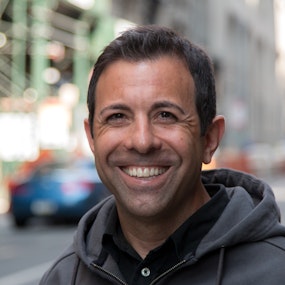
Jon Tota
Host, LearningLife with Jon Tota
on Tota began his career as a business analyst and trainer in the financial services industry and co-founded Edulence in 2002 to deliver digital media training to financial advisors. Jon created Knowledgelink as one of the first subscription-based online video training services and evolved it into a software platform to help experts and corporations educate employees and customers anywhere. Knowledgelink has gone on to deliver hundreds of thousands of online courses each year to over half a million users and become the leading video training platform in multiple vertical industries.
The team at Edulence scaled the Knowledgelink business to earn several industry awards over the years, including consecutive years on the Inc. 5000 list of fastest growing companies in America. In 2020, Edulence was acquired by eLearning Brothers to make Knowledgelink the LMS platform for one of the most trusted brands in the Learning & Development space. Today, Jon leads product design for LMS/LXP platforms at eLearning Brothers and serves as a product evangelist for the company to help customers get the most value from their eLearning solutions.
In 2016, Jon founded Syntax + Motion, a video and podcast production studio in Burlington, VT where the team has produced 7 original podcast shows available on all major channels. For the past 3 years and over 100 episodes, Jon has hosted the popular weekly Learning & Development interview show, Learning Life with Jon Tota.
From 2017-2020, Jon served as the global Virtual Learning Chair for Entrepreneurs' Organi… Read More
New to Futurized podcast?
Here are some great episodes to start with. Or, check out episodes by topic.



































